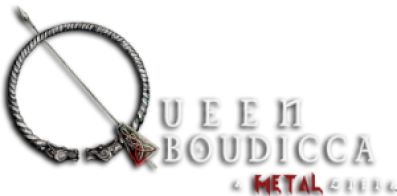Transatlantic Conversations #2


Letters to Ellen Beare 2
“With regards to your tagline (‘Everyone would know the courage of
Boudicca if she had been a man’), is the opera seeking to celebrate or
educate about Boudicca?”.”
As I mentioned in a previous answer, I first learned about Boudicca a few years ago
from a documentary on the History Channel. I was stunned that this piece of history was so obscure. I am convinced that it would be much better known if Boudicca had been a man. In my opinion, racism, xenophobia, and any other type of persecution of people
different from ourselves pales in comparison to the treatment of women in most male
dominated societies (in other words, most societies). The Roman concept of women as property stands out in sharp
relief to the Celtic society, wherein a woman could be a military leader and Queen.
In my Opera I am carrying on the bardic tradition of recounting an important piece of
history (however fragmented and incomplete) in song, but mostly I was seeking to humanize her character. Whether or not the real Boudicca would ever say or think anything like the
character I created, one thing is certain: she was a real person and therefore much more complicated and multi-faceted than the typical depiction gleaned from the raw history. I tried to imagine a fully realized personality using what information I could gain as a
frame work.
There is also an element of celebrating Boudicca. I feel a deep respect for
anyone that could stand against the Roman Empire and nearly emerge victorious, and I
think everyone else should also. In fact, I came away feeling that Tacitus had a great
deal of respect for Boudicca despite the fact that she was a woman. Boudicca was a
woman of extraordinary intellect, courage, and resourcefulness, she should be
remembered and celebrated.
“Can you give a little insight into the relationship between Boudicca
and Asceawa?”
Asceawa is in love with Boudicca. The song Lay Down My Life is meant to show her
mixed feelings of love, hero worship, and godlike reverence for Boudicca. This turns
out to be a dangerous mix, Asceawa’s intense desire to see her Queen immortalized in
song turns out a little different than she would have preferred!
Originally I concieved the character as male, a more traditional love interest, but
Adrienne Cowan was such an intense presence during rehearsals that I began to think
that she would be perfect for the role.
I could be criticized for throwing in a gratuitous homosexual element to get attention,
but that would be completely missing the point. According to many of the descriptions I found of early Celtic society, the mere fact of homosexual relationships was not at all
uncommon or stigmatized. The reason that Asceawa feels that her love for Boudicca
will not come to fruition is because they are separated by caste. She knows she will
never marry a Queen. Hence the lyric ” All these many years I have watched you,
watched you from afar, so unworthy”.
Many authors have said that characters they created took on a life of their own, almost
independent of their creator. Well into the rehearsal process I began to think that
Asceawa could also be interpreted as the side of Boudicca’s character that is raw,
savage, and hostile. As long as it makes the viewer think about these characters as real, any alternate interpretation is cool with me.
There is nothing in the libretto that postively states that Boudicca is aware of or
reciprocates Asceawa’s feelings, but the role certainly could be played that way. The
libretto does clearly indicate that she has a great deal of respect and confidence in
Asceawa as a warrior, and would even allow her to lead the Iceni military campaign.
Asceawa is, as I said in an earlier answer, a complete fabrication and is not based on
any real historical character.
